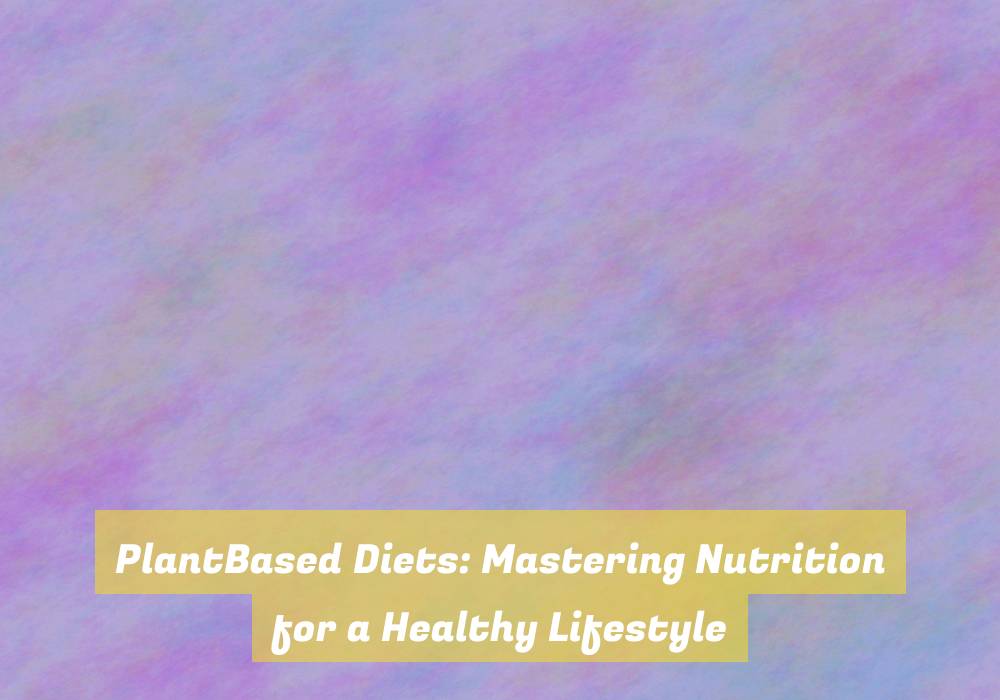PlantBased Diets: Mastering Nutrition for a Healthy Lifestyle
So, youG??ve been thinking about making some changes to your diet and lifestyle. Perhaps youG??re interested in exploring new ways to improve your overall well-being and health.
Well, have you ever considered the potential benefits of adopting a more plant-based approach to your nutrition? ItG??s not just about eating more vegetables and fruits G?? itG??s about mastering the art of nourishing your body in a way that promotes long-term health and vitality.
If you want to discover how to optimize your nutrition and achieve a healthy lifestyle through plant-based diets, then youG??re in for an insightful journey.
Benefits of a Plant-Based Diet
Enjoy the multitude of benefits that come with adopting a plant-based diet, such as improved heart health and lower risk of chronic diseases.
By choosing to focus on plant foods, you can significantly reduce your intake of saturated fats and cholesterol, leading to better cardiovascular health. In fact, research has shown that individuals who follow a plant-based diet tend to have lower blood pressure and cholesterol levels, which can decrease the risk of heart disease and stroke.
Additionally, the abundance of fiber, vitamins, and antioxidants in plant-based foods can help boost your immune system and reduce inflammation in the body, further lowering the risk of developing chronic diseases like diabetes and certain types of cancer.
Furthermore, embracing a plant-based diet can also contribute to better weight management. Plant-based foods are generally lower in calories and saturated fats, making it easier to maintain a healthy weight. With a focus on nutrient-dense fruits, vegetables, whole grains, and legumes, you can feel satisfied while supporting your overall health and well-being.
Making the switch to a plant-based diet empowers you to take control of your health and enjoy the many advantages it offers.
Essential Nutrients for Plant-Based Nutrition
By adopting a plant-based diet, you can ensure that youG??re obtaining all the essential nutrients necessary for optimal health and well-being. ItG??s essential to focus on getting enough protein, iron, calcium, vitamin D, vitamin B12, and omega-3 fatty acids from plant-based sources.
Legumes, tofu, tempeh, seitan, and edamame are great sources of plant-based protein. You can obtain iron from foods like lentils, chickpeas, tofu, and spinach. For calcium, include foods such as fortified plant milk, tofu, almonds, and leafy green vegetables in your diet.
Since vitamin D is primarily obtained from sunlight, consider fortified foods or a supplement. Vitamin B12, crucial for nerve function and energy production, can be found in fortified foods or supplements. Lastly, omega-3 fatty acids are abundant in flaxseeds, chia seeds, hemp seeds, walnuts, and algae oil.
Meal Planning and Balanced Eating
When planning your meals and striving for balanced eating on a plant-based diet, itG??s important to ensure that youG??re incorporating a variety of nutrient-dense foods to meet your bodyG??s needs. Aim to include a wide range of fruits, vegetables, whole grains, legumes, nuts, and seeds in your daily meals. These foods provide essential vitamins, minerals, fiber, and antioxidants that are vital for your overall health and well-being.
To ensure a well-rounded intake of nutrients, make it a point to vary the colors of the fruits and vegetables you consume. Different colors often indicate different nutrients, so incorporating a rainbow of produce into your meals can help you cover a broad spectrum of essential vitamins and minerals.
Additionally, consider incorporating sources of plant-based protein such as tofu, tempeh, lentils, and chickpeas into your meals. These protein-rich foods arenG??t only beneficial for muscle maintenance and repair but also contribute to a feeling of fullness and satisfaction after meals.
Lastly, donG??t forget about healthy fats. Include sources like avocados, nuts, and seeds in your meals to ensure youG??re getting an adequate intake of essential fatty acids. By focusing on variety and balance, you can optimize your plant-based diet for overall health and wellness.
Tips for Success on a Plant-Based Diet
To successfully maintain a plant-based diet, itG??s crucial to focus on nutrient-rich foods and mindful meal planning. When transitioning to a plant-based diet, start by familiarizing yourself with a variety of fruits, vegetables, whole grains, legumes, nuts, and seeds. Embrace the abundance of flavors and textures these foods offer, and experiment with different cooking methods to keep your meals exciting.
ItG??s important to plan your meals ahead of time. Set aside a day for meal prep to ensure that you have nutritious options readily available throughout the week. Additionally, educate yourself about plant-based sources of key nutrients such as protein, iron, calcium, and vitamin B12 to ensure that your diet remains well-balanced.
Remember to stay hydrated and incorporate plenty of water, herbal teas, and hydrating fruits and vegetables into your daily routine. Lastly, seek out community and support, whether itG??s through local plant-based meetups, online forums, or social media groups. Surrounding yourself with like-minded individuals can provide inspiration, motivation, and valuable resources for your plant-based journey.
Conclusion
In conclusion, plant-based diets offer numerous health benefits and can provide all essential nutrients for a healthy lifestyle. By focusing on balanced meal planning and incorporating a variety of plant-based foods, you can successfully thrive on a plant-based diet.
Remember to stay informed about your nutritional needs and seek out support from a healthcare professional or nutritionist to ensure youG??re meeting your dietary requirements. With dedication and mindful eating, you can master nutrition and enjoy a vibrant, plant-based lifestyle.







I really resonate with your take on plant-based diets! I’ve been experimenting with incorporating more plant foods into my meals over the last few months, and it’s surprising how much better I feel—not just physically but mentally too. I used to think going plant-based meant sacrificing flavor, but I’ve discovered so many recipes that are bursting with taste!